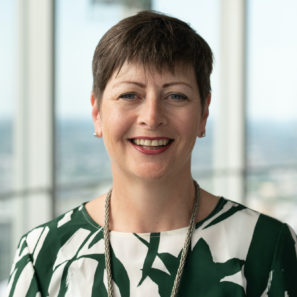Partnership for a 100% digitally included UK
Chair of our Board of Trustees, Liz Williams MBE, highlights how COVID-19 has exposed the human impact of digital exclusion like never before. The personal stories behind DevicesDotNow hammer that home.
John used to rely on a local online centre for internet access until lockdown plunged him into isolation and mental health challenges. As a registered carer for his brother, he’s now using the device we provided to stay in touch with friends and family and to look for jobs. Peggy was unable to do online shopping before she received her device. She was forced to walk miles to the shops at the height of the pandemic, despite being elderly and especially at risk.
As the immediate public health emergency passes and social distancing restrictions start to ease, it’s clear that digital will continue to shape our daily lives – whether it’s ordering a pint in the pub through an app, accessing the essential services that are increasingly online-only, or keeping up with loved ones who have become harder to visit in person.
And yet, despite new levels of dependency on digital, the UK doesn’t have a national strategy to deliver 100% digital inclusion. Today around a quarter of the UK population don’t have the digital skills the government define as essential for life and work. Tackling that is, arguably, a national emergency; critical to recovery, future resilience and growth. A key to resolving national economic productivity challenges, but also for community and personal prosperity and wellbeing.
As we reflect on what we’ve learned through DevicesDotNow, the coronavirus and lockdown provided new insights into the opportunities we have as a national to harness digital to build a recovery that works for everyone.
We saw the UK’s strategy of sustained investment in digital infrastructure pay off. If you had access, connectivity wasn’t an issue. In fact, despite unprecedented spikes in demand, the UK’s telecoms networks performed brilliantly throughout the crisis. The issue was more human. It was about personal access to the telecoms network. Having a device, having enough devices within a household, and having the right device for the task in hand. A smartphone is brilliant but not great for education purposes! And it was about access to data. We learned a huge amount about limited users of the internet on low data packages, who constantly topped up via free WIFI hotspots that disappeared overnight as the nation locked down. Often leaving them having to make unpalatable choices about buying data or food.
And we saw huge changes in motivation. As people scrambled to find new digital ways to do the things that mattered, from zoom church services to family quiz nights, from working from home to staying in touch with grandchildren. Before Covid, the UK had a massive motivation gap. Lockdown changed that. We have the opportunity to capitalise on that newfound will and use it to help everyone build new skills. The digital skills they’ll need to participate fully in the UK’s reopening. It’s often staggering to those that can, but today, around 12% of us cannot open an app. On the bright side, 78% of people recognise that their need for digital skills has increased due to Covid and 57% want to continue building our skills now that lockdown is over.
We have a massive opportunity, FutureDotNow is calling for a public/private partnership to deliver a 100% digitally included UK. Today we’re some distance away. But we’re working with our corporate partners to inspire, challenge and support them to motivate and upskill their employees, customers, and communities. And we’re asking Government to make a 100% digitally included UK a cross-cutting policy priority.
COVID-19 has shown how essential digital skills are to us all, we must come together – government, business, and civil society – to urgently invest to step change the UK’s digital capability to secure our recovery, and ensure everyone can get back to their best in life and work.

Liz Williams MBE
CEO, FutureDotNow
Liz heads BT’s tech literacy programme which aims to help build a culture of tech literacy, where it is viewed as a cornerstone of modern education. Liz is Chair of the Good Things Foundation and recently chaired a review of digital skills on behalf of the UK Government.
